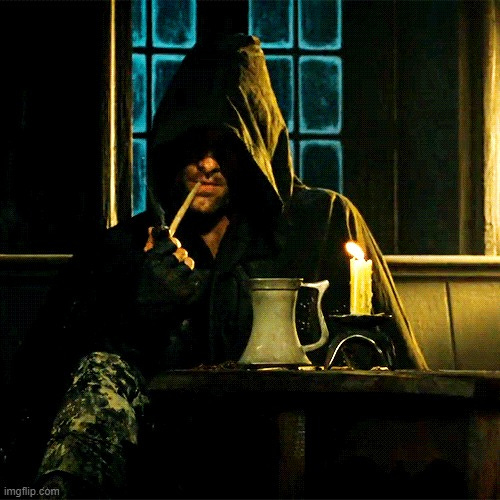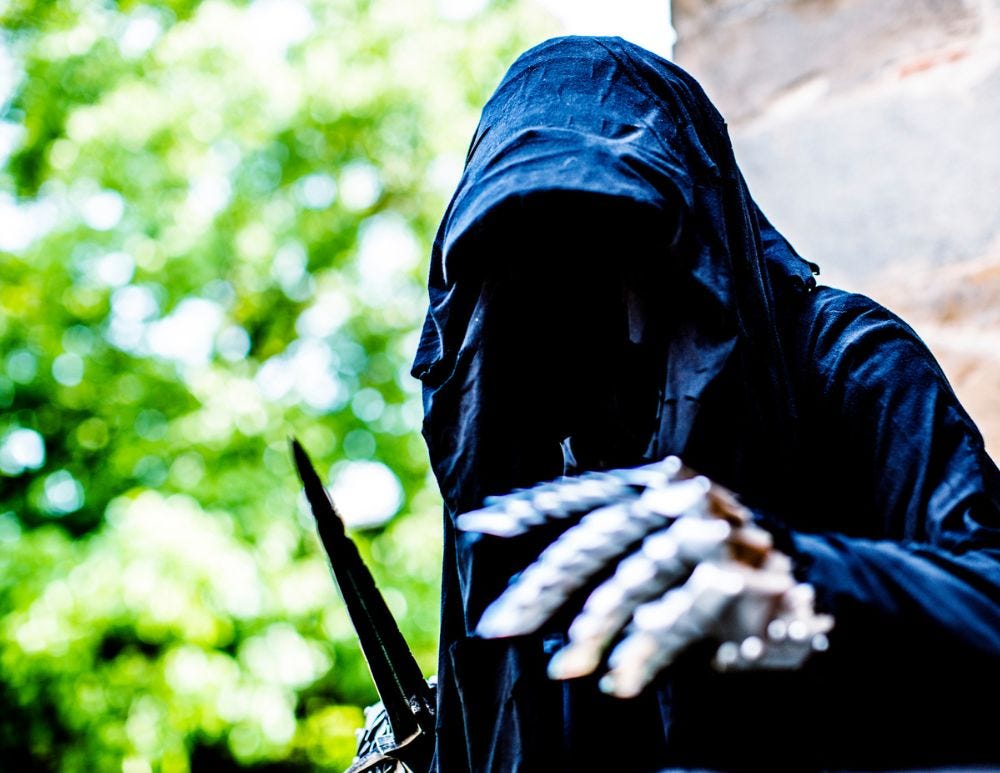This is not the Shire
The world is not safe. In the West, we want to think it is. We want to think we’ve conquered, mastered, and subdued the cosmos, turning it into a polite suburb of paradise. We’re wrong.
For most of us, our everyday experience is comfortable enough. We can watch anything we want. Go anywhere we desire. Buy the things we need. Avoid hunger and conflict. Numb or distract ourselves from pain.
The Shire we’ve created through our prosperity is a tempting illusion. But just outside the boundaries of our cozy boroughs, there is danger. The forest creaks outside the wall. And beyond that, the world is wild.
Our kids sense this danger. That is why they imagine monsters. Sometimes the teenagers feel it keenly and react strongly to things they perceive as threats—whether real or hyped.
But we are all—kids and adults—lulled back into the complacency of our relative peace and satisfaction.
It’s unpleasant to think of the dangers that may lurk around us. But we must.
If we do not, we will not be prepared when they break in on our lives. Worse, if we do nothing to train our children to understand the world’s dangers, they will fare worse than we will. I think the evidence of that approach is playing out in the news right now.
The black riders—the Nazgûl—will invade your peace. What will you do then? What will your kids do?
Enter the Ranger
Aragorn has earned the respect, even fear, of men. The hobbits, wary after their first tastes of danger, are suspicious of him. They don’t know his intent is to lead them on an adventure through more peril than they can imagine. He sees what they cannot see. And he knows they cannot trust a feeling of safety.
They must venture forth. With his help, they can face the danger and begin to grow up.
Your hobbits may be suspicious of you if you decide to take them on an adventure. Or they may be thrilled. Either way, they cannot perceive the true dangers ahead. To equip ourselves for the task, Aragorn has several places to offer guidance and encouragement.
The Protector
“I am Aragorn, son of Arathorn; and if by my life or death I can save you, I will.”
Aragorn’s first responsibility over the hobbits is as protector. This is one of the core features of virtuous masculinity.
Defense of others sits beside the principle of self-defense. We all have the right to defend ourselves from harm, but if we are not strong enough to do so, then others may rightly intervene on our behalf. A virtuous man seeks to prevent the strong from harming the weak and defenseless. He does not wish for evil to win over meekness. So, he will step in to protect those who are weaker. He will stand up for them even if it costs him dearly.
Children are the top example of those who need protection from evil.
This makes your role as defender one of the most urgent. Though as we will see later; it is not primary.
To overprotect is to create the same illusion of safety and comfort that the Shire does. We must protect them from real threats—even if the little ones aren’t ready to know about them fully. But we also have contrasting duties that are arguably more important.
Others have used the imagery of the sheepdog to explain this responsibility. It fits.
The sheepdog calmly watches over the flock and scans the horizon for danger. It only engages when he recognizes a threat. The protector’s presence is often enough to prevent harm. The dog only fights if the danger is deadly.
Aragorn, likewise, patrols the perimeter. He knows the secret paths and the places of relative safety. He has the skill to engage when the enemy strikes.
As a protector, you must be trained to recognize and meet potential threats—and willing to give everything to protect those under your care.
But you do not need to meet every threat head-on. There is often more protection in avoiding trouble than in fighting against it. Cunning may prevail over strength. Aragorn often outsmarts the agents of death, only fighting when there is no other choice.
To exercise cunning you first need to learn it. For that, we need another of Aragorn’s traits.
The Adventurer
Aragorn has the advantage of experience over the halflings. He’s wandered the wilderness. He’s fallen for traps and escaped. He’s learned his place and purpose in the world.
You have experience, too. Maybe you’re an adventurer who can navigate a trackless forest. Maybe not. But you’ve done things your kids haven’t.
That means you have experiences—good and bad—to shape how you help them navigate the world.
That might be in the woods. It’s a great place to take your kids on adventures and expose them to managed risks.
Even if nature isn’t your arena, there are other dangers you’ve faced that your kids know nothing about. If you’ve faced some problem in your life, if you’ve taken risks, if you’ve made mistakes, or learned something through hardship—then you have had adventures you can share with them.
They might seem mundane to you now, but did it feel dull in the moment?
Think about your challenges, your errors, your wins and losses, your tough breaks, or “lucky” days. Did they feel drab at the time? I hope not.
They may not have been epic, but if they stirred up something inside you then it was the type of adventure you can lead your young ones through when you decide it’s time. That may be some activity with risk that you lead them into on purpose, like camping, rock climbing, or learning to use firearms. Or it could be psychological risks you help them navigate—trying out for a team, taking a test, handling a relationship, opening a business, speaking in public.
There will also be times when the adventure is thrust upon them without warning, as in Frodo’s story. Then, you can guide and lead as best you can toward safety.
The more of your own adventures you’ve had, the more prepared you’ll be to help them. And when I say adventures, I mean both hardships you’ve endured and quests you’ve chosen. Tap into the Western virtues of curiosity and exploration to challenge yourself and open new horizons. By choosing challenge, you equip yourself and your children.
Consider your past and future exploits in light of their potential to teach you how to help those in your care. Then use those lessons to grow the next of Aragorn’s traits.
The Leader
Aragorn has had his own adventures and learned much from them. That prepares him to lead the hobbits on their own adventure. This story is about them; not you. They are the future.
Just like comfortable hobbits, our children are ignorant of the dangers of the world—until they’re not.
Either the chaos and evil will teach them, or you will.
When Aragorn meets Frodo, he asks if the hobbit is afraid. The dialogue shows the difference between their positions. The movie version keeps it crisp:
Aragorn: Are you afraid?
Frodo: Yes.
Aragorn: Not nearly frightened enough; I know what hunts you.
Frodo is frightened of what he does not understand. He is afraid of the unknown.
Aragorn knows what he is up against. He understands the nature and scope of the danger. Because of his knowledge and experience, he also knows ways to avoid or limit the risk. That’s what qualifies him to lead the hobbits through the wilderness in spite of the threat.
You must have had your own times of risk and hardship to understand them and have strategies against them—your own adventures. But in that, you also need the discernment between good and evil, right and wrong, to steer your decisions. It is not fun to consider the evil we see in the world, but we must understand it.
Know the Nazgûl that stalk your charges.
If you don’t, you cannot lead them through the dangers they face. I wouldn’t encourage their fear, as Aragorn did, unless it’s merited. In Frodo’s case, the threat was torturous death, so sure, invoke a little fear. But in most cases, be realistic about risks and consequences.
Each kid is going to have their own challenges and hardships to face, along with their own fears. They will be tempted by or targeted by different evils.
The easy road to leadership is to pick the evils that are most in your face—the ones you see on the news. Or the ones you fear the most. Those are also the easiest to understand and train your kids against.
But the black riders work in secrecy and solitude. That makes your true job harder. You may not see the biggest danger to your kids until a disaster makes it obvious. The virtue of truth is a powerful weapon in your arsenal against this. Learn it. Use it.
You can also help mitigate those pitfalls by leading your kids into adventures and controlled risks that give you the opportunity to teach them both values and skills. We can only prepare them for the wild world by equipping them for it. Teach them the truth of the dangers out there and make them capable of facing them.
This is greater than simple protection against every harm. If you protect them without equipping them, you leave them defenseless when you’re not around. You have trained them to be helpless. Train them, instead, to be ready.
Leadership is something that every dad needs. Done properly it is an exercise in your rightful authority.
Lead in words. Lead in deeds. Lead in wisdom. Lead in virtue. Lead by example.
Also, lead actively by taking your hobbits with you on the adventure.
But…if you choose to live this way, then like Aragorn, you will fail.
Your hobbit will be pierced by the cold blade of sorrow. They will be wounded by pain, loss, or accident. Mostly, they will find wounds because of sin—both their own, and from others. That is an unavoidable cost to being human.
You cannot protect them from all threats.
Take heart that failure in the impossible is no measure of virtue. It gives you the opportunity to take on Aragorn’s last quality. It may be the most important.
The Healer
Aragorn cannot shield Frodo completely from the black riders. On the exposed hill called Weathertop, they descend and strike the halfling.
It is not a fatal blow, but without proper care, it will destroy him. It will turn him into an undead creature like the riders. Even with treatment, the scar will haunt his days.
We are not supermen. We are not Gods. As fathers, we will fail in our role as protector or leader.
At some point your children will be hurt. Physical hurts mostly heal. Emotional ones can, too.
My biggest concerns are those wounds that can turn a person into an emotional or spiritual wraith.
Whatever the source of the hurt, follow Aragorn’s example.
Adopt the virtues of mercy and grace. (These are still in the realm of manliness, though they have a masculine expression that may look different from how you normally see them.)
Be there to comfort and offer aid. Show that you care but don’t coddle. Respond in a way that fits the injury. Avoid making it worse with your reaction—but also don’t let your kids blow something out of proportion. This is another way to lead. Learning it may require more adventures of your own.
At times, a right response may be to have the humility to recognize that this injury is beyond your ability. That may be during a true emergency. It may also be times when one of those hidden things blows up.
In those times, offer the help you can and hurry your hobbit to someone who is qualified, just as Aragorn rushed Frodo to the expert, Elrond.
After healing, acknowledge scars—but don’t let them stop your halfling from continuing the adventure. They will continue to have adventures and dangers waiting for them.
Like Aragorn, pursue healing in the long-term. His entire mission to assist Frodo was aimed at healing many wrongs in Middle Earth. In your family, let adventuring, defending, and leading serve a healing mission of greater health and peace over the course of generations.
If we can each take a page from Aragorn’s story, we can raise a generation stronger and more virtuous. That may end up healing many wrongs in actual Earth.
Thank you for reading. I’d love to know: What are you strengths as dad, and how do you want to improve?
Articles in this Series:
In addition to Imago Dad, Brandon Wilborn writes fantasy with spiritual themes. His current project is a series for young readers that aims to teach the next generation the classic virtues of our Judeo-Christian heritage. To learn more about Brandon’s fiction, visit BrandonWilborn.com










I shared with my son. This is awesome!
What a delightful read! I loved the analysis of Aaragorn as a father figure as he care for, led and protected the Hobbits. He is my second favorite character in the trilogy and you've paralleled him nicely.